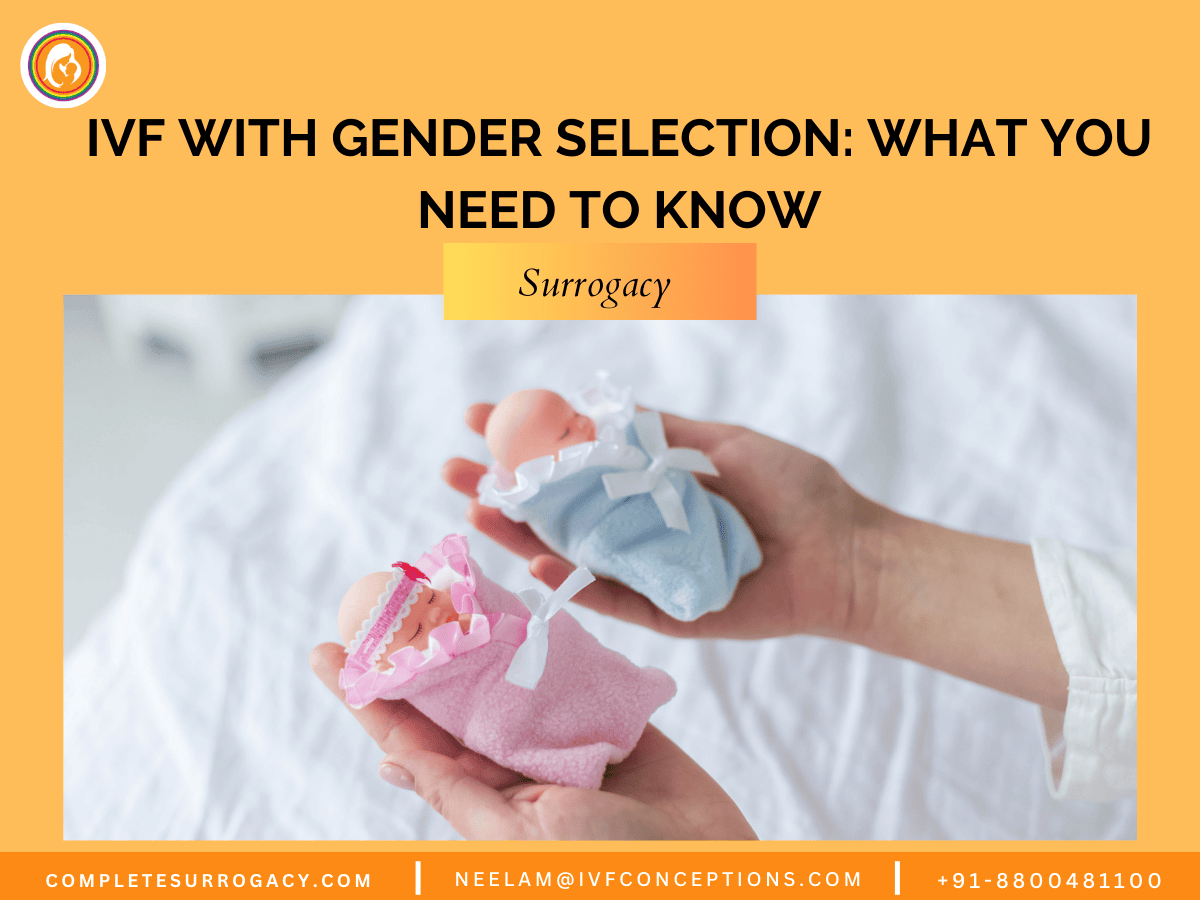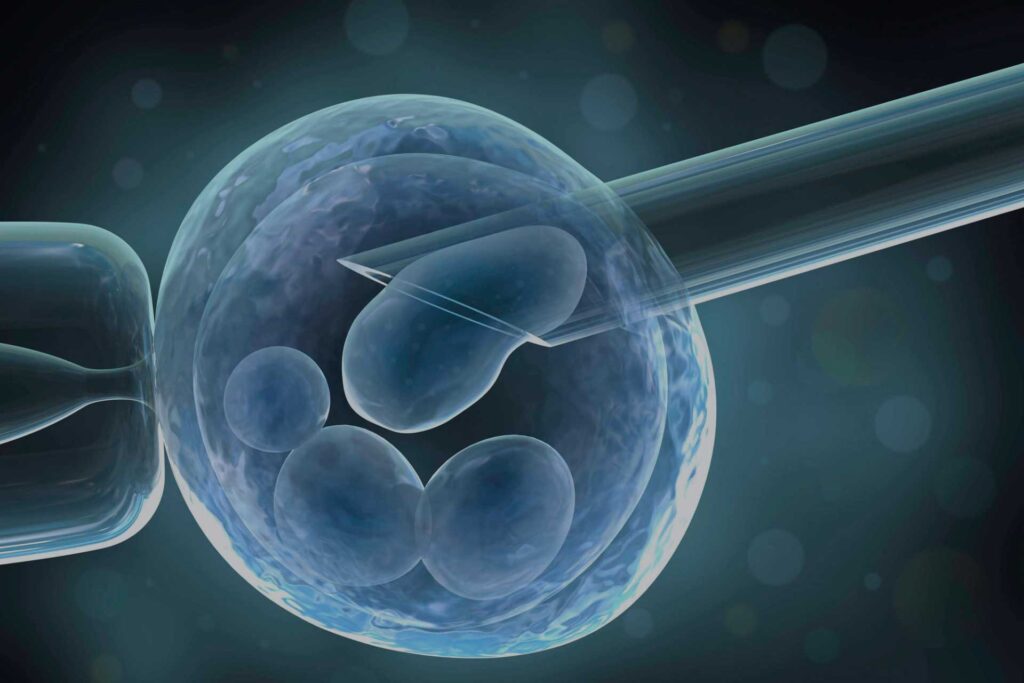IVF with Gender Selection: What You Need to Know

In the world of fertility treatments, IVF with gender selection is a topic of both excitement and debate. It’s also known as sex selection or family balancing. This method lets parents choose the genetic sex of their embryos before implantation. But what does this mean, and what are the ethical questions it raises? Let’s look into the details of IVF with gender selection.
Note: Gender selection is not legally permitted in India. The practice is strictly prohibited under the Pre-Conception and Pre-Natal Diagnostic Techniques (PCPNDT) Act, which aims to prevent gender-based discrimination and ensure ethical reproductive practices. Intended parents considering surrogacy in India must adhere to these legal guidelines and avoid any procedures or requests related to gender selection.
Pls note that: Gender Selection is not allowed in India.
- Book an online appointment: Get a free online consultation.
- Call\W:+91-8800481100 Email:neelam@ivfconceptions.com
Key Takeaways
- IVF with gender selection involves determining the genetic sex of embryos created through in vitro fertilization and selecting an embryo of the desired gender for implantation.
- The practice is allowed in the United States, but many fertility clinics do not offer it due to ethical concerns and controversies around the issue.
- Preimplantation genetic testing (PGT) is the key technology used to identify the sex of embryos prior to implantation.
- Reasons for choosing IVF with gender selection include medical considerations and personal preferences for family balancing.
- Ethical debates surround issues such as the potential for gender bias, societal implications, and the fate of unused embryos.
More Resources to Read:
Is Surrogacy Legal in Georgia Country
Complete Surrogacy Cost in Georgia Country
Understanding IVF with Gender Selection
In vitro fertilization (IVF) with gender selection lets parents pick the sex of their child. It uses IVF and genetic testing to find out the embryo’s gender before transfer. This way, only the desired sex embryos are transferred, allowing parents to choose their child’s gender.

What is IVF with Gender Selection?
IVF with gender selection combines IVF with genetic testing. It starts with IVF, where eggs are fertilized with sperm. Then, genetic testing is used to check the embryos’ sex. Only the embryos of the chosen gender are transferred, aiming for a pregnancy.
How the Process Works
The steps for IVF with gender selection are:
- Ovarian stimulation: The woman gets multiple eggs ready for retrieval.
- Egg retrieval: Eggs are taken out with a minor surgery.
- Fertilization: Eggs are fertilized with sperm to make embryos.
- Preimplantation genetic testing (PGT): Embryos are tested for gender using genetic analysis.
- Embryo transfer: Only the chosen gender embryos are transferred. The rest are frozen, donated, or discarded.
The gender selection success rate is over 99.9 percent. This means parents can pick their child’s sex with great confidence.
What is IVF for Family Balancing?
Some couples choose IVF with gender selection for family balancing. They use IVF and genetic testing to have a child of the opposite sex. This way, they aim to have both boys and girls, enriching their family life.
About 9 percent of IVF/PGD cycles in the US in 2005 were for nonmedical sex selection. The accuracy of sperm sorting for sex selection is 84 to 92 percent. But, there’s not much data on the risks to the offspring from biopsies.
The American Society for Reproductive Medicine hasn’t agreed on elective sex selection. But, the European Society of Human Reproduction and Embryology allows it for family balancing under certain conditions. Preimplantation genetic diagnosis and screening (PGD/S) is seen as a better choice for sex selection.
PGT (preimplantation genetic testing) services are used for sex selection. They take a cell sample from a frozen embryo and check its sex in a lab. This helps in finding healthy embryos for pregnancy.
“Nearly 100% accuracy in screening embryos for gender through pre-implantation genetic screening (PGS) technology.”
Gender selection helps balance families or screen for genetic disorders. Dallas IVF offers this service, being the first in Collin County, Texas, since 2009.

Preimplantation Genetic Testing (PGT)
Preimplantation genetic testing (PGT), also known as preimplantation genetic diagnosis (PGD), is a key technology for IVF with gender selection. It takes a few cells from each embryo and checks for X or Y chromosomes. This way, only the desired sex embryos are transferred to the uterus.
PGT is a vital tool in modern fertility treatments. It lets couples make informed choices about their family planning. It also screens embryos for chromosomal abnormalities and genetic disorders, boosting the chances of a healthy pregnancy and child.
Types of Preimplantation Genetic Testing
- PGT-A: Finds chromosomally normal embryos, improving IVF success by choosing the best embryos for implantation.
- PGT-M: Diagnoses single gene disorders like cystic fibrosis and fragile X syndrome. It lets couples select unaffected embryos.
- PGT-SR: Helps individuals with chromosome rearrangements avoid creating embryos with incorrect chromosome numbers or structures.
PGT is a crucial tool in reproductive medicine. It gives couples the chance to plan their family and ensure the health of their future children.
| PGT Application | Purpose |
| PGT-A | Identify chromosomally normal embryos |
| PGT-M | Diagnose single gene disorders |
| PGT-SR | Prevent chromosome rearrangements |
Preimplantation Genetic Testing (PGT) is a highly accurate method for sex selection during IVF. It has a success rate close to 100%. This technology gives couples a reliable way to choose their child’s gender, unlike other methods.
“The team at Dr. Morris’ clinic has been incredibly professional and informative throughout our IVF journey. Their expertise in PGT and family planning has been invaluable, and we’re thrilled with the birth of our healthy child.”
Reasons for Choosing IVF with Gender Selection
Choosing IVF with gender selection has many reasons. It’s a way to use advanced technology for health and family reasons. It can greatly change the lives of parents and their children.

Medical Reasons
IVF with gender selection is key when there’s a risk of genetic disorders. These disorders often affect one gender more. By testing embryos, couples can pick the healthier sex. This lowers the risk of passing on serious genetic problems.
Family Balancing
Another reason is family balancing. It’s about having a child of the opposite sex from existing ones. This makes the family more balanced with both boys and girls. Many parents think it makes their family richer and gives kids different views.
| IVF Gender Selection Success Rates at EuroCARE IVF (2019) | Success Rate |
| 20-29 age group | 77% |
| 30-34 age group | 65% |
| 35-39 age group | 48% |
| 40-44 age group | 25% |
PGT methods like PGS and PGD are very accurate. They can be over 99% accurate. This makes IVF with gender selection a solid choice for health and family reasons.
Ethical Considerations
IVF with gender selection brings up many ethical concerns. One big issue is what happens to the unused embryos of the non-selected sex. They might be thrown away, used for research, or kept frozen for later. Some people find this very troubling.
There’s also fear that letting parents pick their child’s gender could make one sex seem less valuable. This could lead to an imbalance in the number of boys and girls in the population. This imbalance has been seen in some countries where sex selection is allowed.
Potential Risks
Using IVF for gender selection comes with medical and societal risks. The IVF process itself can lead to issues like low birth weight and birth defects. It might also affect the long-term health of the child.
The genetic tests needed for gender selection also have risks. They can give wrong results or reveal unexpected genetic information.
Gender Bias and Societal Implications
Another concern is how IVF with gender selection might reinforce gender biases. It could make one sex seem less important or lead to an imbalance in the population. This imbalance could cause problems in society, like social instability.
“The ethics committee discourages the initiation of IVF with PGD solely for sex selection purposes to prevent risks of gender bias and social harm according to a 2001 report.”
The ethics of IVF with gender selection are complex. We must think carefully about the benefits and risks. We need to make sure this technology is used fairly and responsibly.
Legal and Professional Guidelines

In vitro fertilization (IVF) for gender selection is a topic of debate. Laws and guidelines vary by country and region. In the United States, there’s no federal ban on using IVF for gender selection. But, some states have their own rules.
The American Society for Reproductive Medicine (ASRM) advises against using IVF for choosing a baby’s gender. Yet, they see it as okay in some medical cases. For example, to avoid passing on serious genetic disorders linked to sex.
Doctors and fertility clinics have their own rules on gender selection services. These rules might depend on ethics and local laws. People thinking about IVF for gender selection should check the laws and guidelines in their area.
| Country | Regulations on Gender Selection through IVF |
| United States | No federal laws prohibiting, but some states have restrictions |
| China | Banned for non-medical reasons |
| India | Banned for non-medical reasons |
| Israel | Allowed for family balancing if family has 4 children of one sex |
It’s crucial for those thinking about IVF for gender selection to know the laws and guidelines in their area. They should also think deeply about the ethical sides of this issue.
More Resources to Read:
Surrogacy Guide for Surrogate Mothers
Surrogacy Guide for Intended Parents
How does the surrogacy process work
Conclusion
In-vitro fertilization (IVF) with gender selection is now more common. It lets couples choose the sex of their baby. This is done through preimplantation genetic testing (PGT).
Some see it as a good choice, but others worry about gender bias and its effects. They also think about what happens to embryos that aren’t used.
As IVF technology grows, so does the debate. It’s important to use this technology wisely. Fertility clinics have different rules about using PGT for gender selection.
Couples should think carefully before choosing this option. They need to consider the risks, costs, and ethics involved.
Choosing IVF for gender selection is a big decision. It affects families and society. As technology improves, finding a balance is key. We must respect people’s choices while ensuring fairness and well-being for all.
If you’d like to learn more about IVF, Egg Donation, or surrogacy services globally, check out the rest of our website at Complete Surrogacy Agency. We offer legally secure and affordable surrogacy consulting services for FREE.
Pls note that: Gender Selection is not allowed in India.
Get in touch for FREE SURROGACY CONSULTING:
Mobile: +91-8800481100 ( WhatsApp, Line, Viber)
Email: neelam@ivfconceptions.com
FAQ–IVF with Gender Selection
What is IVF with Gender Selection?
IVF with gender selection lets couples choose the sex of their baby. It uses in vitro fertilization (IVF) to create embryos. Then, they pick an embryo of the sex they want.
How does the IVF with Gender Selection process work?
First, IVF is done like usual. Eggs are taken from the woman and mixed with sperm. Then, the embryos are tested to see their sex.
Only the embryos of the chosen sex are used. They are then put back into the woman’s uterus.
What is IVF for Family Balancing?
Some couples want a balanced family. They use IVF to have a child of the opposite sex. This way, they have both boys and girls.
What is Preimplantation Genetic Testing (PGT)?
PGT is key for IVF with gender selection. It tests a few cells from each embryo. This shows if it’s a boy or girl, based on X or Y chromosomes.
What are the reasons for choosing IVF with Gender Selection?
Couples choose it for medical reasons or family balance. Medical reasons include avoiding genetic disorders. Family balancing means having a child of the opposite sex.
What are the ethical concerns around IVF with Gender Selection?
Ethical worries include what happens to unused embryos. There’s also concern about gender biases and population ratios.
What techniques are used for genetic testing on IVF embryos?
PGT is the most common method. It checks for X or Y chromosomes. Sperm sorting is another technique used.
What are the legal and professional guidelines around IVF with Gender Selection?
In the U.S., there are no federal laws against it. But, some states have rules. Professional groups like ASRM have guidelines. They say it’s okay in some medical cases.
Source Links
- https://www.rbafertility.com/blog/5-things-to-consider-before-doing-gender-selection – 5 Things to Consider before Doing Gender Selection | Reproductive Biology Associates
- https://dallasivf.com/fertility-treatments/ivf/sex-selection/ – Sex Selection with PGT | Dallas IVF Fertility Center
- https://journalofethics.ama-assn.org/article/sex-selection-family-balancing/2014-10 – Sex Selection for Family Balancing
- https://parkavefertility.com/in-vitro-fertilization/preimplantation-genetic-testing/ – Preimplantation Genetic Testing

Author Bio: Neelam Chhagani is an International Surrogacy Expert with 15 years of experience in the fertility and surrogacy domain. As the founder of IVF Conceptions and Complete Surrogacy, she has guided over 4,000 intended parents worldwide on their surrogacy journey to parenthood. Recognized as a trusted authority, she specializes in holistic infertility solutions and third-party reproduction consulting.
Holding an MA in Counselling Psychology and a PGD in Mental Health, Neelam is a proud member of the European Fertility Society (EFS) and the European Society of Human Reproduction and Embryology (ESHRE). She is also a leading surrogacy blogger, providing valuable insights into ethical and practical surrogacy solutions.
Since 2010, committed to supporting ALL family types, Neelam has been passionate about helping intended parents grow their families with compassion, integrity, and a focus on secure and affordable surrogacy options Globally.
Learn more about Neelam:
https://www.ivfconceptions.com/neelam-chhagani-surrogacy-consultant/
https://www.linkedin.com/in/neelam-chhagani-92892229/















I was introduced to Neelam by a friend who worked with Neelam for surrogacy. Neelam is absolutely wonderful. I am a single male and the journey to fatherhood is not that easy. Neelam connected me to a program ideal for my circumstances. She was with me throughout the pregnancy providing advice and guidance along the way. I am so grateful I found her and am thrilled today that I have a beautiful daughter. I highly recommend Neelam to anyone who is on a journey to become a parent. Having a child has changed my world for the better. I wish others success with their own journey and recommend you connect with Neelam to find a path that is best for you.
SA (USA)